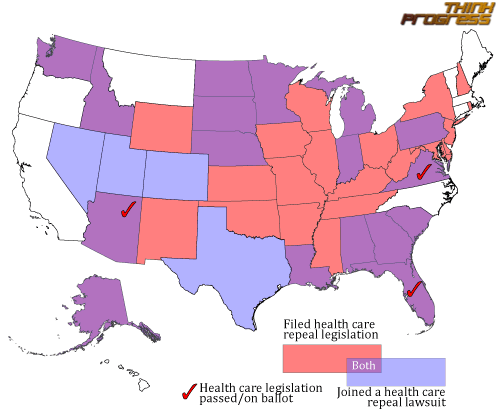With the news that 41 states are trying to repeal part or all of the recent health reform law, it's time for reform advocates to wake up. In the 2010 elections, people who are the most angry will win unless we all participate. I knew that there were some number of state attorneys general who were suing over the individual mandate, but I assumed they would not get very far. What is scary about the map below is the number of states that will be tying up the courts with somewhat frivolous lawsuits and initiatives that will hopefully be declared unconstitutional. But maybe not.

Most of the opposition to reform focuses on the individual mandate, so let me start with that. One of the reasons we have such high costs right now is that we are not all "in". Some of us do not carry insurance for a variety of reasons, and so when we get sick, someone else pays. That would be you and me if you are insured. It seems reasonable to me that this could make people who are being responsible and paying their fair share kind of mad. Kind of Tea Party-ish mad, actually. But not for the reasons the Tea Party would think. The unfairness now comes, not from the government, but actually from your neighbors. Imagine the individual mandate in place but some significant number of states and individuals do not contribute their fair share. What happens?
Jonathan Gruber of the Center for American Progress explains.
Conservatives began discussing repealing controversial elements of the Patient Protection and Affordable Care Act, or PPACA, within moments of President Barack Obama signing the historic health care reform bill. One of those elements is the individual mandate. The new reform imposes a penalty on individuals who remain uninsured even though they can afford health insurance--if coverage costs less than 8 percent of their income. The penalty is a fixed dollar amount (rising from $95 to $695 from 2014 to 2016) or a percentage of income (rising from 1 percent of income to 2.5 percent of income from 2014 to 2016), whichever is larger.
This new requirement to purchase insurance is clearly a major innovation in U.S. public policy. But it is also a central pillar of health reform. Without the individual mandate, the entire structure of reform would fail. Removing the mandate would:
Reduce the legislation's insurance coverage gains by more than two-thirds, so that reform would cover fewer than one-fifth of the uninsured
Cause the reduction in employer-sponsored insurance to quadruple
Raise individual premiums in the exchange by 40 percent
The rest of us would now be suffering from higher costs because others were not pulling their weight (much like we do today although most people don't seem to realize that). And guess what else? When those same folks who do not purchase insurance get sick, they will want help with their medical bills. They will have to have help because even a one night stay in a hospital would bust their bank accounts. At that point they will want to buy insurance or dump their debt on the hospital or doctor, who will then charge all of us more. The fact that they didn't contribute to the "pool" will have meant that they pushed all of our premiums up, so they will buying in (if we even allow that) at a higher price than they would have in the beginning. What don't people get about that? As Gruber points out, the five states that have tried to undertake nongroup (individual) health insurance reforms without a mandate are the states with the most expensive insurance.
One of the most distressing aspects of this state backlash is that a small number of demagogues are making it necessary for the rest of us to have to fight this on a state by state basis. If there is an initiative in your state, and you don't want it to win, you will have to spend money on advertising and shoe leather to get it defeated. That makes me mad and it should make you mad too if you care about health care costs.
Where does that leave us? At the moment, we will be fighting these state initiatives and paying for these lawsuits, at the same time as the federal government will actually be working to implement reform. It's possible that the furor over health reform will subside as the benefits slowly kick in, but so far the evidence for that is not compelling. And while the individual mandate in Massachusetts has not been overturned, it has been gamed to some degree. But then, that's Massachusetts, which can produce both Kennedy as well as a Romney and Scott. The rest of the states could well pass these initiatives of repeal.
What can you do? Learn the facts about the cost of health care and the cost of not having everyone contribute and share it with your friends and colleagues. And check your state on that map above and this website of the American Legislative Exchange Council, a right wing group that has been actively promoting these state initiatives to repeal reform.
